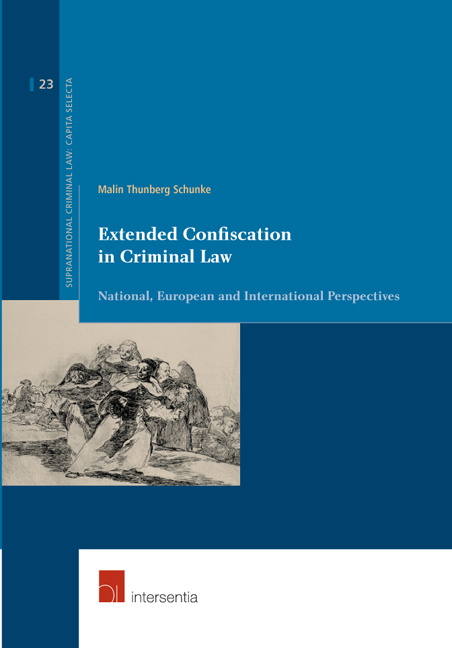Book contents
- Frontmatter
- Preface
- Contents
- Table of Cases
- List of Abbreviations
- Part I Introduction
- Part II Substantive Provisions on Extended Confiscation
- Part III The Legal Framework for International Cooperation
- Chapter 8 International Cooperation in the Area of Confiscation
- Chapter 9 Cross-Border Asset Tracing and Exchange of Information
- Chapter 10 International Cooperation in Order to Seize or Freeze Assets
- Chapter 11 International Cooperation in Order to Execute Final Confiscation Orders
- Chapter 12 The Proposal for a Regulation on Mutual Recognition
- Chapter 13 Final Remarks: “To Go for the Money” – But How?
- Bibliography
- Index
- About the Author
Chapter 11 - International Cooperation in Order to Execute Final Confiscation Orders
from Part III - The Legal Framework for International Cooperation
Published online by Cambridge University Press: 11 October 2018
- Frontmatter
- Preface
- Contents
- Table of Cases
- List of Abbreviations
- Part I Introduction
- Part II Substantive Provisions on Extended Confiscation
- Part III The Legal Framework for International Cooperation
- Chapter 8 International Cooperation in the Area of Confiscation
- Chapter 9 Cross-Border Asset Tracing and Exchange of Information
- Chapter 10 International Cooperation in Order to Seize or Freeze Assets
- Chapter 11 International Cooperation in Order to Execute Final Confiscation Orders
- Chapter 12 The Proposal for a Regulation on Mutual Recognition
- Chapter 13 Final Remarks: “To Go for the Money” – But How?
- Bibliography
- Index
- About the Author
Summary
THE LEGAL FRAMEWORK
REQUESTS FOR MLA
An international basis to request judicial assistance from other States in order to recognise and enforce the execution of a final confiscation order can be found in several treaties, for example Article 13 of the European Convention on Laundering, Search, Seizure and Confiscation of the Proceeds from Crime (1990), Article 13 of the United Nations Convention against Transnational Organized Crime (2000), Article 5 of the United Nations Convention against Illicit Traffic in Narcotic Drugs and Psychotropic Substances (1988) and Article 23 of the Council of Europe Convention on Laundering, Search, Seizure and Confiscation of the Proceeds from Crime and on the Financing of Terrorism (2005). In general, the provisions on cooperation on the basis of MLA obligate a requested State either to enforce a confiscation order made by a court of a requesting State or to submit the request to its own competent authorities for the purpose of obtaining a domestic order of confiscation and, if such order is granted, enforce it. The traditional procedure for MLA applies, and common grounds for refusal of such assistance are, for example, a lack of double criminality, violations of ordre public or concern for the principle of ne bis in idem.
THE FD ON CONFISCATION ORDERS
General Provisions
Within the EU more advanced cooperation based on mutual recognition has been introduced within the area of final confiscation orders by the FD on Confiscation Orders. The purpose of this instrument is to establish the rules under which a Member State must recognise and execute in its territory a confiscation order issued by a court competent in criminal matters of another Member State. In this way, the FD on Freezing Orders has been complemented with an instrument which regulates also the handling of transnational final confiscation orders in accordance with the criteria of mutual recognition. The instrument should have been implemented by 24 November 2008. In 2010, the European Commission concluded in a mutual evaluation report that the degree of implementation was not satisfactory, as only 13 Member States had implemented the instrument. Since then the situation has improved, although the instrument has not yet been implemented by Greece, Slovakia, Ireland and Luxembourg (as of February 2017).
- Type
- Chapter
- Information
- Extended Confiscation in Criminal LawNational, European and International Perspectives, pp. 281 - 302Publisher: IntersentiaPrint publication year: 2017



